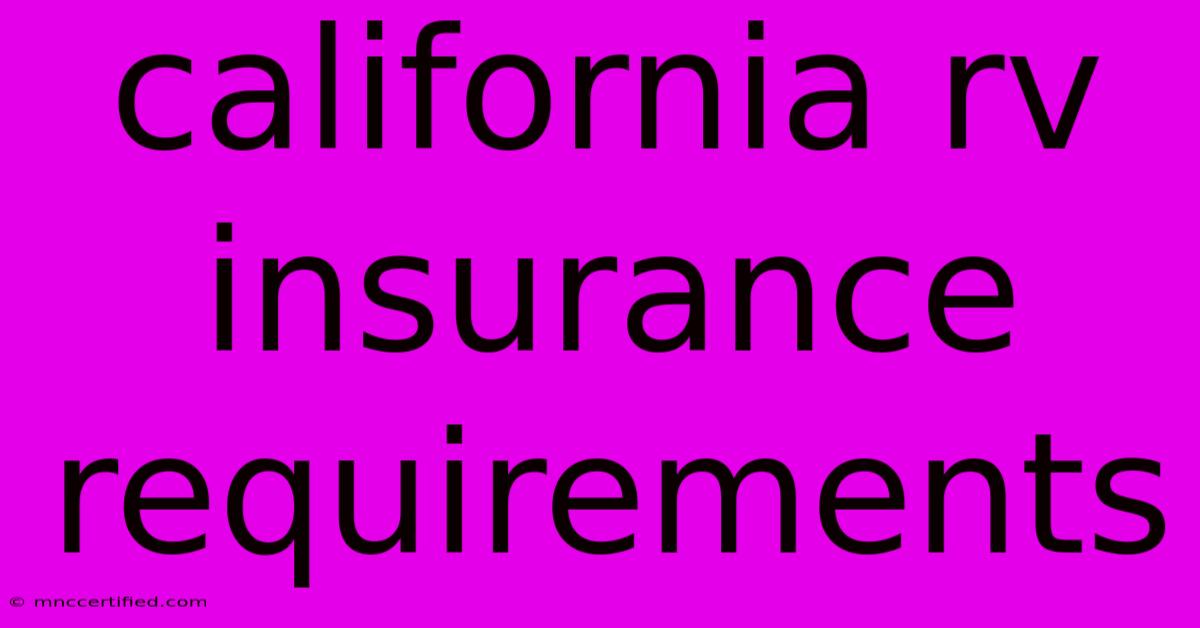California Rv Insurance Requirements

Table of Contents
California RV Insurance Requirements: What You Need to Know
Owning an RV in California can be an incredible experience, offering the freedom to explore the state's diverse landscapes and attractions. However, it's crucial to understand the specific insurance requirements for RVs in California to ensure you're protected on the road.
Understanding California's RV Insurance Laws
While California law doesn't explicitly require separate RV insurance, it mandates liability coverage for all motor vehicles, including RVs. This means you must have at least the following:
- $15,000 bodily injury liability per person
- $30,000 bodily injury liability per accident
- $5,000 property damage liability
These minimums are designed to cover damages you might cause to another person or property in an accident. However, it's strongly recommended to go beyond the minimums and secure adequate insurance coverage to protect yourself financially in case of an accident or incident.
Key Types of RV Insurance Coverage in California
While liability coverage is mandatory, there are several additional types of insurance that are highly recommended for RV owners:
- Collision Coverage: Covers damage to your RV resulting from an accident, regardless of fault.
- Comprehensive Coverage: Protects your RV from damage caused by events other than collisions, such as theft, vandalism, fire, or natural disasters.
- Uninsured/Underinsured Motorist Coverage: Provides protection if you're involved in an accident with a driver who is uninsured or underinsured.
- Medical Payments Coverage: Covers medical expenses for you and your passengers in the event of an accident, regardless of fault.
- Personal Injury Protection (PIP): Offers coverage for your own medical expenses, lost wages, and other expenses following an accident.
- Rental Reimbursement Coverage: Helps cover the cost of renting a replacement RV if yours is damaged or stolen.
- Roadside Assistance Coverage: Provides emergency assistance, such as towing, flat tire changes, and jump-starts.
- Liability Coverage for Towed Vehicles: Ensures you're protected if a towed vehicle causes damage to another vehicle or property.
Choosing the Right RV Insurance Policy
The best RV insurance policy for you will depend on factors such as:
- The value of your RV: If your RV is worth more, you'll need higher coverage limits.
- The frequency of your RV use: If you travel frequently, you may need more comprehensive coverage.
- Your budget: Insurance premiums vary depending on the coverage you choose and other factors.
It's essential to compare quotes from multiple insurance companies to find the best rates and coverage options that meet your needs.
Additional Considerations for RV Insurance in California
- State-specific laws: Some states have specific regulations regarding RV insurance, so make sure to check with your insurer about any additional requirements.
- RV usage: If you use your RV for commercial purposes, you'll need a different type of insurance policy.
- Personal belongings: You may need additional coverage for personal belongings inside your RV.
- Discounts: Insurance companies offer various discounts for factors like good driving records, safety features, and RV memberships.
Conclusion
Navigating California's RV insurance requirements can be complex. By understanding the mandatory liability coverage, exploring additional coverage options, and carefully choosing the right insurance policy, you can protect yourself and your investment while enjoying the freedom of RV travel in the Golden State. Remember to consult with an insurance agent to ensure you have the right coverage tailored to your specific needs and circumstances.

Thank you for visiting our website wich cover about California Rv Insurance Requirements. We hope the information provided has been useful to you. Feel free to contact us if you have any questions or need further assistance. See you next time and dont miss to bookmark.
Featured Posts
-
Stores Open On November 11th In France
Nov 11, 2024
-
Steelers Edge Opponent New Wr Delivers Game Winner
Nov 11, 2024
-
Benson Boone Nails Trademark Flip
Nov 11, 2024
-
Wilson Rallies Steelers For Game Winning Td
Nov 11, 2024
-
49 Years Since Edmund Fitzgerald Disaster
Nov 11, 2024